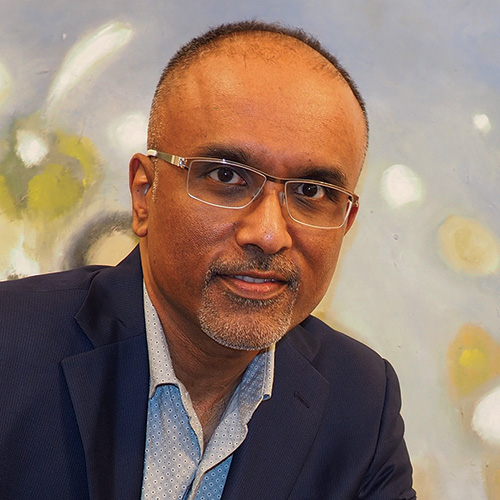After almost two years of US election campaign coverage, what have we learned from the great exporters of democracy? We have learned that anger at economic inequality runs deep. We have learned that the imminent demographic shift from a white majority to a majority of minorities threatens some to the point of violence. We have learned that misogyny and racism are acceptable political discourse. We have learned that the art of politics is not compromise, or ethical statesmanship or ideological reasoning. The art of politics is winning. Subtlety and reason have given way to polarisation, to us versus other, to loud, unapologetic, dogged hate. We have learned that spinning hate is good strategy.
Samuel Huntington would have us believe that the world is witnessing a clash of civilisations articulated through obstinate religious disputes. In Hate Spin, Cherian George opts for a slightly less grandiose narrative. Religions, he reasons, are not monolithic divisive doctrines but are multivocal and diverse. The contemporary manifestation of religious coherence and political resolution then must be the outcome of strategic cultural framing. Drawing on works from political sociology, he explains that such a strategy encourages the formation of in-groups through the construction of hostile, threatening out-groups. The threat to democracy is not group-based religious fervour but rather the “political entrepreneurs” who construct and manipulate it.
For George, these midwives of populist hate strategically manufacture vilification and use it to exploit group identities, mobilise supporters and coerce opponents. They spin hate and “cloak their power-seeking motives in the guise of popular outpourings of religious sentiment”.
The framing is now familiar: “They hate us. They envy us. They want to harm us. So we must get rid of them.” Hate Spin turns our gaze towards those framers: those who define “us” and “them”; who convince “us” that “they” are a threat; who decide that such threats must be eradicated; and who loudly articulate outrage at our victimhood.
In erecting this frame, agents of spin have redefined hate speech. Conventional hate speech concerns offence-giving by those who are intolerant of diversity. George identifies more recent claims of victimisation by those with significant hegemonic power as a type of aggression – of indignant offence-taking. This strategy deftly exploits democratic freedoms by “harnessing group identities as a resource for anti-democratic collective action”.
The Charlie Hebdo killings, attacks on the homes of Copts in Egypt and hate speech by Afro-Brazilian candomblé religious leaders all serve as evidence of this outbreak of offence-taking in contemporary politics. Unsurprisingly in each case, those taking the most offence are religious groups. Religion provides a reliable source for strategic framing. The symbols, rituals, solidarities and reliance on authoritarian guidance prime in-group members, readying them to hate the “other” when instructed. Religious offendedness is an “extremely elastic resource that can be used with very little political cost”.
Hate spin agents use such righteous indignation to increase their own political power. George cites Paul Brass’ work on “spontaneous” riots in India, highlighting a network of specialists with the capacity and motivation to interpret events and encourage mass violence. Similarly, he could have noted Thomas Frank’s argument that working-class constituents in Kansas have been persuaded to vote against their economic interest through the Christian Right’s manipulation of social issues such as abortion and homosexuality.
George offers considerable evidence of the scale of hate spin, with substantive chapters focusing on the Hindu Right in India, the Muslim Right in Indonesia and the Christian Right in America, who he observes are “all quite capable of anti-democratic exclusivist attitudes and actions”. The discussions of India and Indonesia, alongside a disturbing chapter on the globalisation of offendedness via Google, are as convincing as they are worrying.
The performance of offendedness can appear as a spontaneous uprising, apparently emerging out of the blue. Without careful attention to the political context, these can remain unintelligible to the media, and to viewers with little time for historical and political detail. For example, the rise of the Tea Party in the US was portrayed initially in the UK media as a new grass-roots movement, but closer inspection shows that its constituents and leadership overlapped with the Christian Right, who held sway with the Republican Party for more than 50 years. The grass-roots outrage and offendedness was a learned response transferred between these political outlets.
In gathering evidence from the US, George draws attention to the “Islamophobia industry” via the metanarratives and factoids that, through repetition, have become “common sense”, particularly among Donald Trump’s constituents. Although it dismisses arguments for a vast right-wing conspiracy, the Center for American Progress, a liberal thinktank, argues that one can nevertheless find “a half a dozen self-styled, mutually referencing experts generating most of the anti-Islam propaganda in the US”. Their information is then picked up and disseminated through religious leaders and sympathetic politicians.
One of the “classic” items in the hate spin repertoire, says George, is the challenging of textbooks in schools. He who controls the textbooks, controls the political frame for generations. For example, the Alabama-based group ACT! for America claims to be offended by mainstream social studies books whose “multicultural approach” allows for the “infiltration of Islamic falsehoods”. Here, George’s evidence just scratches the surface. In Texas, Don McLeroy, chair of the State Board of Education, spent years convincing textbook publishers to include creationism alongside evolution, a tale recounted in the 2012 documentary The Revisionaries. Both Newt Gingrich and William Bennett, Ronald Reagan’s secretary of education, advocate the rewriting of history textbooks to identify America as a Christian nation, rather than one endorsing religious freedom for all.
George’s thesis makes sense. Expressions of “offendedness” from those in power are notable in contemporary political discourse, even here in the UK. Political strategists now hop between democracies offering election advice, and party elites share “good practice”. Building a constituency, an in-group, is easily accomplished by constructing a threat, an out-group. Spinning this hate is just politics by another means. For George, our ambivalence to this state of affairs is the real worry.
Hate spin corrodes the civic values upon which democracy is built. If we are to turn the tide, journalism itself must share the responsibility. In an era marked by the “Fox News effect” of erroneous commentary parading as fact, and more mainstream news driven by frames of conflict and sensationalism, we must learn to embrace a more ethical form of journalism. Alongside this, George calls upon civil society to better articulate the virtues of democracy and a political mobilisation of the middle ground. Faith-based groups must voice more audibly their commitment to civic inclusivity. What we need, and what we all need to be better at, is an “assertive pluralism” that proudly rearticulates the “multicultural, equality-protecting constitutional order”.
If not, George argues, we are doomed to the continued growth of a “deformed version” of democracy that “elevates the popular will above the rights of the individual”. This is the democratic vote minus democratic values, dazzling the many even as it is “blind to the injustices suffered by the few”.
In the past two years, we have watched American democracy contort itself into a deformed version of polarised populism, stripped of its modern virtues of inclusivity, equality and social justice. George’s work demonstrates that this is a problem not just for the US, but one facing all developed democracies. The growing propensity for offence-taking by those with hegemonic power, the intensity of the anger whipped up, and the increasing acceptability of hate should worry us all.
Angelia R. Wilson is professor of politics, University of Manchester.
Hate Spin: The Manufacture of Religious Offense and its Threat to Democracy
By Cherian George
MIT Press, 328pp, £22.95
ISBN 9780262035309 and 62336062 (e-book)
Published 11 November 2016
The author

Journalist and scholar Cherian George, who joined Hong Kong Baptist University as associate professor in the department of journalism in 2014, was formerly head of the journalism programme at Nanyang Technological University in Singapore, where in 2010 he won its highest teaching award.
He was born and raised in Singapore. “My country has been good to me: the strength of its economy has translated into opportunities that I might not have had elsewhere. Singapore is a multicultural, immigrant nation, the most religiously-diverse in the world. That’s probably influenced my appreciation for diversity as something that’s both inescapable and positive.”
A “definitely bookish” child, George is the son of immigrants from Kerala in south India. “I’m happy to lay claim to Kerala’s literary and journalistic heritage, as well as India’s ‘argumentative’ tradition, as Amartya Sen called it.”
As an undergraduate at the University of Cambridge, he was a “pretty average student and probably didn’t make full use of the experience. But it did give me a sense of the civilisational role of universities, which later on added to the attraction of an academic life.”
On the rise of digital journalism, George observes that “the internet is the most open information and communication technology ever. The bad news is that it is also open to anti-democratic forces; the good news is that they can't completely colonise it. So it’s a competition. And of course the offline balance of power has a huge influence. That’s where the main battles for the future of the internet have to take place, not in cyberspace.”
Which of the examples of ‘hate spin’ covered in his book does he find the most worrying? “Hate spin can produce extreme results, even genocide, in places like Myanmar where human rights and the rule of law are not well developed. Hate spin in Western democracies has less extreme direct effects — discrimination and isolated hate crimes — but it’s worrying too, because it diminishes liberal democracy in the eyes of the world. Especially when the victims are Muslims, that feeds into anti-Western hate elsewhere, which is of course very destabilising.”
His former colleagues at NTU, he says, “remain good friends. As for the administration, I suppose it just wasn’t a good fit. University leaders told me I did not have a future at NTU because I posed a ‘reputational risk’. Fortunately, other universities have different ideas about whom they need to impress and how, so I was able to continue my academic career — just not in my homeland.”
Although his new institution, HKBU, “doesn't pretend to be a top-tier research university”, he has been “pleasantly surprised at how much support, in time and funding, there is for research. I'd probably still be working on my book without that institutional support.”
Asked whether his current students are optimistic or cynical, George says: “My Hongkonger students are in the Umbrella Movement generation. They have reason to be upset, because the city’s government has failed them, especially in providing affordable housing.”
What gives him hope? “Martin Luther King said that the arc of the moral universe is long but it bends towards justice. I believe that — that those of us arguing for human rights are on the right side of history. But then again, if we don’t fix climate change, we will see dislocation, destruction and war on a scale like never before; so who knows.”
What gives him hope?
“Martin Luther King said that the arc of the moral universe is long but it bends towards justice. I believe that – that those of us arguing for human rights are on the right side of history. But then again, if we don’t fix climate change, we will see dislocation, destruction and war on a scale like never before; so who knows.”
Karen Shook
POSTSCRIPT:
Print headline: Give us this day our daily outrage
Register to continue
Why register?
- Registration is free and only takes a moment
- Once registered, you can read 3 articles a month
- Sign up for our newsletter
Subscribe
Or subscribe for unlimited access to:
- Unlimited access to news, views, insights & reviews
- Digital editions
- Digital access to THE’s university and college rankings analysis
Already registered or a current subscriber?






